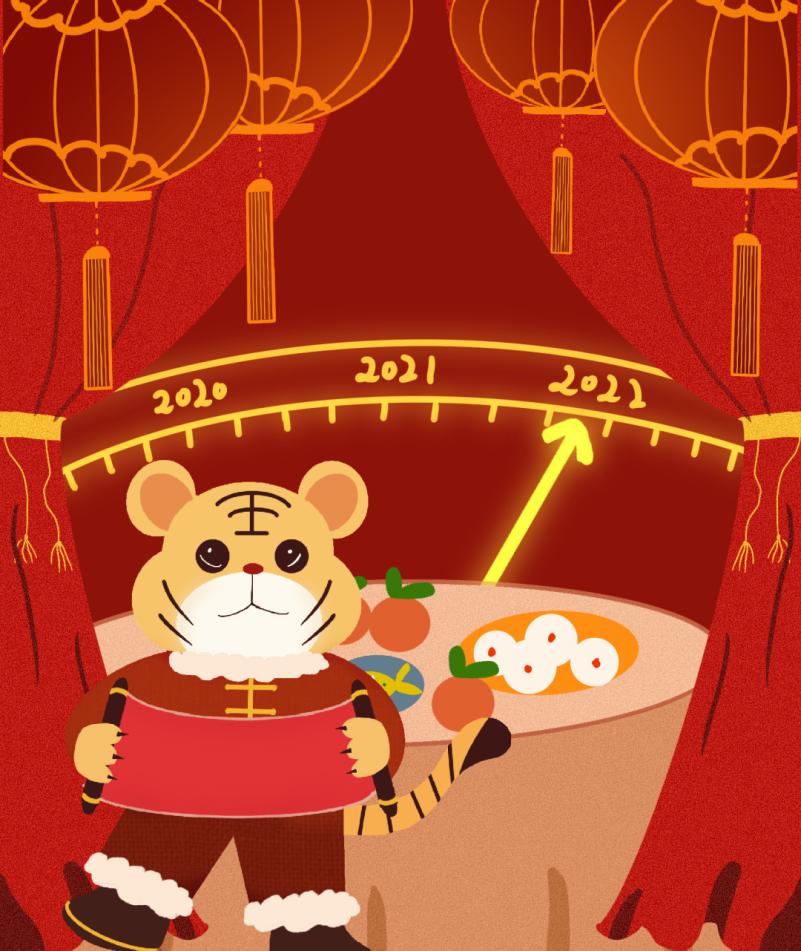
The Year of the Tiger is auspicious
except
New Year
evening
Bao Bojun spent Chinese New Year's Eve with you
Chinese New Year's Eve night, reunion!
The sound of firecrackers resigned,
Happy New Year!
Today is the Chinese New Year's Eve, and in a few hours, when the bells ring in the early hours of the morning, the new year begins. Let's start the countdown together...
Chinese New Year's Eve
Chinese New Year's Eve, also known as the Great Chinese New Year's Eve, Chinese New Year's Eve Night, Except Night, Year Removal, etc., is the last night of the lunar month (December) every year. Division means removal; sunset, which means night. Chinese New Year's Eve is also a festival of resignation and new, unity and renewal.
Chinese New Year's Eve is also known as the Chinese New Year's Eve because it is often on the 29th or 30th day of the lunar month in the summer calendar, and is one of the most important traditional festivals in China. On the most important day at the end of the year, the wanderer who has wandered far away is also in a hurry to go home to reunite with his family, resign the old age in the sound of firecrackers, and welcome the new year with fireworks.
On this day of family reunion, of course, it is indispensable to eat Chinese New Year's Eve meals, in addition, since ancient times, Chinese New Year's Eve has had the custom of staying up all night, keeping the year, sticking to the door gods, pasting the Spring Festival, pasting New Year paintings, hanging lanterns and so on.
Chinese New Year's Eve customs
01
Eat Chinese New Year's Eve meal
Eating Chinese New Year's Eve meal is the most lively and happy time for every household during the New Year's Festival. Big Chinese New Year's Eve, rich New Year dishes are placed on a table, family reunion, sitting around the table, eating a reunion dinner table with large dishes, cold pots, hot stir-fry, dim sum, generally indispensable two things, hot pot and fish. The hot pot is boiling, steaming, warm and inviting, indicating that it is red and hot; "fish" is the harmonic sound of "Yu", symbolizing "auspicious celebration and surplus", and also metaphorically means "every year there is more than enough". There are also radishes commonly known as vegetable heads, wishing for a good color head; lobster, fried fish and other fried foods, wishing the family fortune to prosper such as "fire cooking oil".
According to the old ritual, the traditional seat of the Chinese New Year's Eve Night is "Shangzuo Zundong" and "Facing the Gate as Zun". The chief of the annual feast is the eldest of the generations, and the last seat is the lowest. If it is a guest, the chief is the most honored guest, and the host is the last. The chief did not sit down, the rest could not sit down, the chief did not move, everyone could not move.
02
Paste Spring League
Chunlian, also known as "door pair", "spring paste", "couplet" and "pair", belongs to a kind of Yanglian and is a unique literary form.
Every Spring Festival, every household should pick a beautiful red Spring Festival and paste it on the door, bid farewell to the old and welcome the new, and increase the festive atmosphere. Another source of the Spring League is the Spring Sticker, which the ancients posted the word "Yichun" on the spring day of Lichun, which gradually developed into the Spring League, expressing the chinese working people's good wish to avoid evil and eliminate disasters and welcome good fortune. It is said that this custom originated in the Song Dynasty and became popular in the Ming Dynasty.
03
Stickers for blessings
Posting the word "Fu" during the Spring Festival is a long-standing folk custom. The word "fu" is now interpreted as "happiness", while in the past it meant "blessing" and "good fortune".
The Spring Festival sticker "Fu" word, whether it is now or in the past, is a hope for people's happy life and a wish for a better future. In order to more fully reflect this yearning and wishing, the folk simply pasted the word "fu" upside down, indicating that "happiness has fallen (to) and blessings have poured (to)".
04
Keep the age
Chinese New Year's Eve night vigil is also a long-standing custom, as early as the Western Jin Dynasty "Record of Customs" has a clear record: everyone stays up all night, waiting for the dawn, called "keeping the age".
Legend has it that the age keeper is to prevent the invasion of a unicorn, and this unicorn is most afraid of fire, red and sound, so people Chinese New Year's Eve wear red clothes, light red lights, paste red paper, set off fireworks and firecrackers, burn incense and pray all night, and have a "keeping the age" at night.
Chinese New Year's Eve night, let's keep the old age together.
And look at "children do not sleep, keep vigil and rejoice." Morning chickens and do not sing, but also drums and fears. ”
Wait for tomorrow," the sound of firecrackers in the one-year-old, the spring breeze to send warmth into tusu. Thousands of households always exchange new peaches for old charms. ”
Editor: Jin Wanying
Editor-in-charge: Zhai Huiping
Review: Kang Junjian